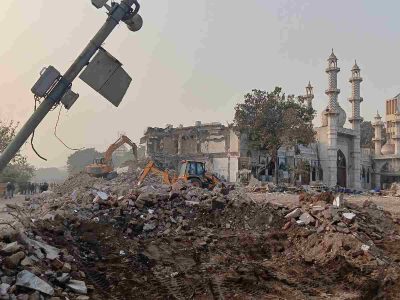Delhi Environment Minister Gopal Rai on Wednesday introduced the city’s Winter Action Plan, which includes measures such as drone monitoring, an enhanced anti-dust campaign, the formation of task forces, road-sweeping machines, and the deployment of 200 mobile anti-smog guns to combat air pollution, under the theme “Mil Kar Chale, Pradushan Se Lade” (Let’s Fight Pollution Together).
Rai stressed the need for collaboration between the government and citizens to address the issue, especially during the winter months when pollution levels peak.
The Winter Action Plan, based on 21 key focus areas, was launched with Rai emphasising the theme of collective action. He stated that the Aam Aadmi Party (AAP) government would begin implementation immediately.
Rai noted that pollution from neighbouring NCR regions significantly impacts Delhi’s air quality but pointed out improvements over the years. He mentioned that in 2016, Delhi experienced 243 polluted days, which dropped to 159 last year, a 34.6% reduction.
Key elements of the plan include drone monitoring of pollution hotspots, a special task force, anti-dust measures, road sweeping, water sprinkling, stubble-burning mitigation, awards for excellence, and awareness campaigns. Rai said drones would monitor pollution hotspots in real-time for the first time, allowing more precise interventions.
A six-member task force has been created to manage pollution levels and respond quickly at critical points. The task force includes representatives from the transport, environment, revenue, and public works departments, as well as the Municipal Corporation of Delhi (MCD) and the traffic police.
An anti-dust campaign will be launched on October 7, with strict penalties for violators. Construction sites larger than 500 square meters must register on a designated website before the campaign begins.
Rai also outlined various activities planned as part of an awareness campaign, including the “Harit Padyatra” (Green Walk), where participants will carry plants to promote greenery. Other initiatives include an electric vehicle parade, an anti-pollution march, and the “Red Light On, Gadi Off” campaign to reduce vehicular emissions.
Acknowledging the severe air quality during winter, Rai said 85 road-sweeping machines and 500 water-sprinkling vehicles will be deployed to control dust. Mobile anti-smog guns will be used three times daily, compared to once a day last year.
A ban on firecrackers will continue, with full enforcement once the notification is issued. The Graded Response Action Plan (GRAP) will be activated, and 588 teams will monitor and prevent the open burning of garbage.
Rai mentioned that the government will promote work-from-home policies and encourage voluntary reductions in private vehicle use. If necessary, the odd-even road rationing scheme could be implemented, and artificial rain is being considered.
The minister also announced the introduction of the “Harit Ratan Award,” which will be given to individuals, private companies, or organisations that excel in reducing pollution.
To address pollution from stubble burning, bio-decomposers will be sprayed over 5,000 acres of farmland. Additionally, a 360-member team will monitor vehicle emissions and ensure compliance with regulations for phasing out older vehicles.
(With inputs from PTI)





